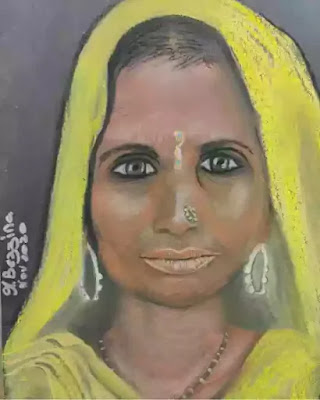Also Read
Jagan's mother is a very ordinary, orthodox and ill-tempered elderly lady of the house. She does not possess any appealing and impressive qualities. Moreover, her role in the novel is tertiary. Narayan has delineated her in the novel as a representative character of the class of mothers-in-law who are generally found to be bossy and unjustifiably partisan, prejudiced and irritable towards their daughters-in-law. The phenomenon of querulous relationship between a daughter-in-law and a mother-in-law is very typical of the Indian middle-class family. Ambika's mother-in-law follows customary code of conduct while dealing with her. She will always blame her daughter-in-law for everything that goes wrong in the day-to-day life. She blames her irrationally for a small incident of over-salting of sauce and also for repeated failure of Jagan in Intermediate and B.A. examinations for no fault of hers. She is insensitive and inhuman in darting irrelevantly her barbed words occasionally at Ambika involving the latter's barrenness or her failure in bringing a gold waist-belt in her marriage. She does not spare her son also. She throws a critical, sarcastic remark at Jagan, "A son is a son until the wife comes", and resents his keeping company with his wife to the extent that other members of the family have become strangers to him. She is in the habit of hurling indiscriminately taunting remarks at her daughter in-law for no reason or rhyme. For a minor incident of over salting the sauce, she holds Ambika totally responsible and bursts out in angry mood saying, "One doesn't ask for extra-ordinary things; they are not for us, we are not destined to enjoy the spectacle of a gold waist-band, like hundreds of others, but one wants atleast a sensible... ." Before she completes the sentence, Ambika loses her patience as she has already been listening to all such ill-mannered, undeserved and provokingly sarcastic comments from her mother-in-law for a pretty long time. Hence, she retorts back aloud, "I don't care.", drops down the dish from her hands and rushes quickly into her room in a sulking mood.
Jagan's mother's frequent carping remarks about Ambika's barrenness reveal in her the lack of human feeling and sympathy. She rather feels a sadistic pleasure in uttering such hurting words. She fails to realise the sad predicament of her daughter-in-law caused by her inability to bear a child even ten years after her marriage. Ambika has grown so sick of her mother-in-law's sarcasm hinting at her infertility that she starts fearing the prospect of the monthly menstrual days. She knows that she will again become a target of her bitter comments.
Jagan's mother is an orthodox woman through and through. She is meticulous in fulfilling a religious ritual as ordained literally by tradition. Jagan's father is haggling with a coconut-seller woman at the foot of Badri hills. He complains of the exorbitant rate she is charging for a coconut and some flowers to be offered to the god in the temple. He reacts by saying that he should have brought these offerings from Malgudi at a much lower rate. These comments of Jagan's father are enough to flare up her temper. She is sitting on a slab of stone and remarks peevishly from there, "That is not permitted, Custom requires...." but before the completion of her sentence, Jagan's father interrupts her saying, "Yes, yes, it is written in the Vedas ten thousand years ago that you must be exploited on this spot of earth by this particular coconut-woman." Ambika's mother-in-law is, no doubt, typical in general of the proverbial behaviour of the class of mother-in-laws in the traditional milieu of an Indian middle-class family. Still, there are exceptions to it. They are the mother-in-laws of Susila in The English Teacher and Chandran's mother in The Bachelor of Arts. However, Ambika's mother-in-law stands as a classical character. Both she and Chandran's mother believe in dowry system.
Jagan's sister's appearance in the novel takes place briefly on two occasions only. She is a harbinger of the news of Jagan's marriage with Ambika as the final approval to the proposal has been accorded by their parents. In this way, the suspense in the mind of the protagonist about this marriage proposal is resolved. Moreover, she is seen darting a sarcastic remark at Jagan for keeping himself aloof from other members of the family after his marriage. She teases him saying that he has forgotten them as much as that he may not be in a position now to recognise them. Once more, she is mentioned by Jagan during his long-continued recapitulation that she is married and no communication-bond exists between the brother and the sister.
All these women delineated in the novel act as catalyst in making Jagan reach the ultimate point of renunciation of the world. The long-continued recapitulation of his past life by Jagan brings him to the existentialist realisation of his utter loneliness and aloofness as he stands cut-off from all human relations one after the other. The panoramic view of his disconnection with his wife after her premature death, with his mother and father on their death, with his sister, after her marriage and the last but not the least, with Grace, upon whom he has relied so much in his old days, pushes him further to the conclusive point of seeking retirement in calm, tranquil and soothing environments of nature across the river Sarayu. In this way, these women collectively play a pivotal role in the final denouement of the novel.
